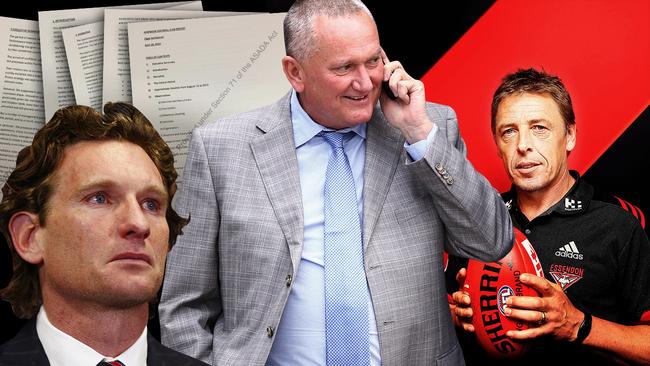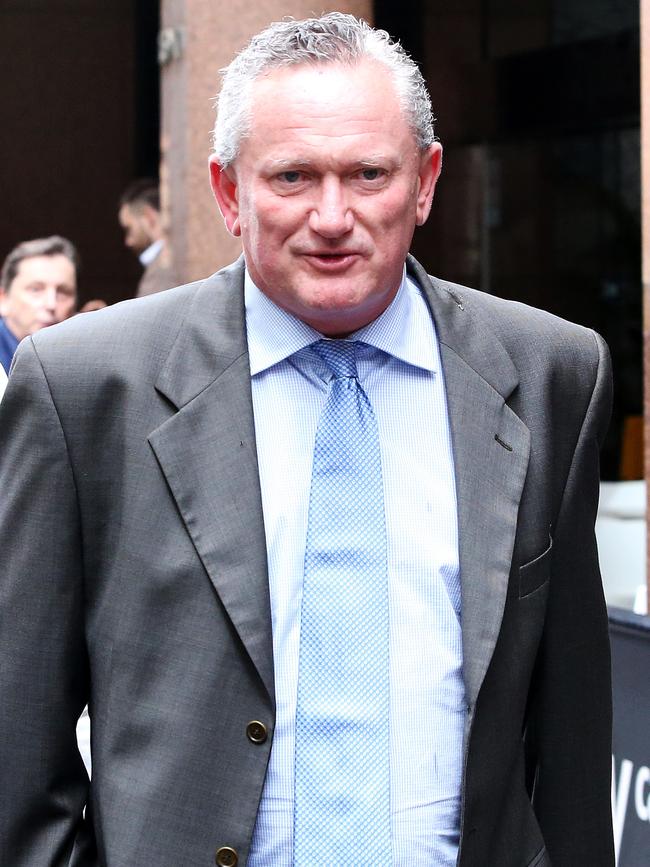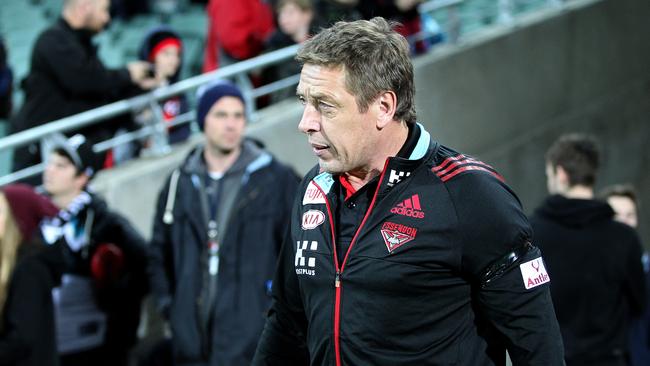Bombers dysfunctional, Stephen Dank an ‘unguided missile’, Switkowski report found
Stephen Dank was an ‘unguided missile’ at a dysfunctional club desperate to return to its former glory, according to never-before-seen review of Essendon’s drugs program by Dr Ziggy Switkowski. READ THE FULL SWITKOWSKI REPORT FOR THE FIRST TIME.

AFL
Don't miss out on the headlines from AFL. Followed categories will be added to My News.
Essendon’s supplements regime architect Stephen Dank was described as an “unguided missile” in the never-before-seen review of the club’s 2012 drugs program by Dr Ziggy Switkowski.
The report into the Bombers’ disastrous injections scheme paints a picture of a dysfunctional organisation desperate to return to its former glory.
But it can be revealed nobody was held ultimately responsible for the ill-fated program in nuclear scientist and former Telstra boss Dr Switkowski’s secret 21-page review.
Chief executive Ian Robson came in for the most acute criticism.
READ THE FULL REPORT AT BOTTOM OF THE ARTICLE
The report was relied on by the AFL to charge four club officials — coach James Hird, assistant coach Mark “Bomber” Thompson, club doctor Bruce Reid and football manager Danny Corcoran — with bringing the game into disrepute.
Dr Switkowski was commissioned to write it by Bombers chairman David Evans three weeks after the club “self-reported” its supplements regime to the AFL and the Australian Sports Anti-Doping Authority on February 5, 2013.

But only a condensed executive summary of the report was ever released, in May 2013.
Among the key findings of the full report, obtained now by the Herald Sun, Dr Switkowski said:
“IF (fitness boss) Dean Robinson was the weapon, Stephen Dank was an unguided missile.”
HIRD’S “playing days could not have prepared him for the environment he took over … lacking confidence, organisational clarity, good discipline and agreed objectives — and with potentially rogue personnel in the system”.
THOMPSON “appeared unpersuaded of the merits of supplements in general”.
THE board discussed risk management at a meeting in June 2012 but “WADA codes etc were not mentioned”.
ROBSON was remote from the football operations which he should have been across, instead obsessing over the club’s new training facility.
Regarding the failings of the Evans-led board, Dr Switkowski said: “Board members must exercise due diligence to ensure compliance and player welfare.”
Confusion reigned under the new sports science team, as “after Robinson and Dank arrived, nothing was ever straightforward again”, he said.
At one stage, Dr Switkowski said Thompson “tore shreds off Dank” in order to reinforce Hird’s direction for the need to be compliant with doping regulations.
Another unnamed club figure told Dr Switkowski: “James gets what he wants; Bomber Thompson does what he wants”.
But in a key failure, “an assumption was made that his (Hird’s) instructions would be followed to the letter”.

When they were hired, Robinson and Dank were seen as “experts in their fields … and Robinson’s tenure at the Geelong Football Club during their successful premiership years gave him special status within the club where former GFC coaches were now in leadership roles,” Dr Switkowski said.
“Upon arrival, they joined a club anxious for on field success (EFC football department was ‘buggered’ after 10 fallow years), led by a head coach receptive to, and welcoming of, their ideas, and a very loose management structure,” he said.
Dank, Dr Switkowski said, was “knowledgeable, even encyclopaedic, on matters of elite sports, very self-confident albeit reclusive, speaking with conviction and replete with technical phrases and formulae which impressed”.
He was also initially generally liked by the players more than Robinson, who was “seen to be high maintenance, mercurial and egotistic”.
“By January 2012, the quirky temperaments and working habits of Robinson and Dank, their relatively poor organisational skills, and confusion about the range and rhythm of supplement use were causing commentary and concerns within the football department if not more broadly.”
Applauding the players’ response, Dr Switkowski said: “The Players’ Leadership Group requested better information and organisation from which developed an ‘Informed Consent’ process whereby every supplement in use was meant to be documented and explained to each player …”
At the same time there was a power struggle between veteran club medico Dr Reid, who was questioning the supplements program, and the new hires.
“The attitude of the new fitness team was that EFC’s medical personnel were yesterday’s men — not abreast of the most modern sports science methodologies,” Dr Switkowski wrote.
Hird “reasserted any supplement must be WADA and ASADA compliant” and “it must not be harmful to players’ health”, Dr Switkowski noted.
“These guidelines are reasonable and unambiguous,” he acknowledged.
“But compliance required robust recording and monitoring processes which proved inadequate,” he said.

Of chief executive Robson, Dr Switkowski wrote: “All matters pertaining to the club are the ultimate accountability of the CEO (ie: the buck stops with him).
“But in this case, Ian Robson appears very remote from the stresses and dramas associated with the fitness personnel and their activities. His attention is externally oriented, especially managing a significant investment in new facilities at Tullamarine.
“There is no reason to dispute the CEO’s claim that he was unaware, but every reason to ask why? At different times during this period, each of (football manager Paul) Hamilton and Corcoran reported to him. He appears not in the chain of command for internal football matters — at least not always …”
Likening the Essendon injections regime to the metaphor of the ‘boiling frog’, Dr Switkowski said it was impossible to blame any single person for the governance failings.
Quoting a Wikipedia extract, he said: “If you drop a frog in a pot of boiling water, it will of course try to clamber out. But if you place it gently in a pot of tepid water and turn the heat on low, it will float there quite placidly.
“As the water gradually heats up, the frog will sink into a tranquil stupor, exactly like one of us in a hot bath, and before long, with a smile on its face, it will unresistingly allow itself to be boiled to death …
“At the EFC, the growth in number and volume of supplements … evolved over a period of weeks, perhaps months …
“Of course, if this description is broadly applicable to the EFC in 2012, then it becomes difficult to sheet accountability to any one person.”
A group seeking the establishment of a fresh inquiry into the Bombers doping saga yesterday said the Dr Switkowski report was a “whitewash” that “enabled the AFL to destroy James Hird and exonerate itself and the Essendon board”.
MORE ON THE ESSENDON DRUG SCANDAL:
ASADA DOCUMENTS CAST DOUBT ON BOMBERS RULING
QUESTIONS OVER EVIDENCE THAT CONVICTED ‘ESSENDON 34’
“The report was supposed to review the governance and processes at Essendon with respect to providing a safe workplace for the players … yet incomprehensibly it did not mention the Victorian Occupational Health & Safety Act, nor did it mention that the AFL commissioners were joint employers (of the players) with the Essendon board,” a spokesman for the group said.
“Such a cover-up meant the report wasn’t worth the paper it was written on.”
Robinson was never charged by the AFL or ASADA, Dank received a lifetime ban from the game, Robson stood down and picked up a job as Melbourne Victory chief soon after.
Hamilton was not sanctioned and AFL charges against Dr Reid were dropped after he refused to accept his penalty.
But Corcoran and Hird were suspended by the league and Thompson was fined, with the latter two suffering significant mental breakdowns in the aftermath of the scandal.
Thirty-four of the Essendon 2012 squad were handed two-year bans by the Court of Arbitration for Sport in January 2016.
